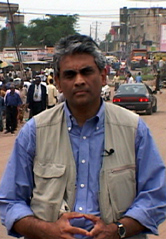Producer Fred de Sam Lazaro discusses the production of “Democracy in the Rough.”
Nowhere is Africa’s curse of riches more vividly on display than the Democratic Republic of Congo. Amid their own grinding poverty, Congolese see foreigners living very well and, with the recent exception of U.N. troops and relief workers, foreigners here have always been enriched by  Congo’s soil, extracting its abundant gold, coltan, cobalt, copper or in the case of the city where our film was shot, diamonds.
Congo’s soil, extracting its abundant gold, coltan, cobalt, copper or in the case of the city where our film was shot, diamonds.
It was against this backdrop that field producer Nikki See, photographer Tom Adair and I went looking for characters for this film in the teeming free-for-all mining areas near Mbuji Mayi. Our visits became more frequent once we did meet Sophie Musawu and “McCoy” Kajanda who became two of our film’s main characters.
With each visit we expected the toiling crowd would grow used to our presence and pay us less attention. Instead, we only seemed to antagonize more.
“Please tell these people who have come to film that we think they are thieves, they are distracting us,” a young man named Mbiya conveyed through our translator.
What right do they have to take our pictures, others asked? What do we get from this?
We struggled for intelligent answers but could find few. There was no denying that (even at PBS) we were being paid an unimaginable amount of money to tell their story.
In the end, I think two strokes of good fortune made it possible to shoot the gripping images of miners in this film. The first was our decision, made as much to defuse the palpable tension as anything else, to invite the angriest miners to vent their grievances on camera. Out came a litany of the historical sorrows that fuels their rage, some of which made the film’s final cut. From Belgian plunder and slavery to America’s support of Mobutu’s kleptocracy, they had no reasons to trust foreigners. This country’s only freely elected prime minister was assassinated with what is widely believed to be CIA and Belgian support. A sympathetic ear has impressive power to console.
Secondly, we hired a young local journalist and invited him to try his hand at our second camera. As a local with a charming, diplomatic manner and most of all a very keen eye, Serge Mukendi Musasa was able to film candid footage no foreigner ever could of the daily routine of miners like McCoy and the hubbub around Sophie’s food stall nearby.
Sophie and McCoy share many of their fellow miners’ ambivalence about the historic elections. But they pose the obvious question: what choice does this country have? Even as Congolese have historical justification to suspect the motives of the international community, they must rely on foreigners to keep the peace, to help them take the first step in rebuilding the country.
It was fascinating to go behind the colorful retail façade of an election where there’s no real need for campaign platforms. “Everything is broken and everything needs to be fixed,” says William Swing, the U.N. Special Representative.
So what explains the large, seemingly enthusiastic crowds we filmed?
For people who must survive on one meal a day campaign rallies provided a second. A meal or drink can guarantee a large crowd. In a place where so many make do with one change of clothing, a free T-shirt is a significant bonus. We met numerous Congolese wearing the visage of candidates they either didn’t know or weren’t going to vote for.
In the end, Sophie and McCoy went not with the T-shirt or drinks-bearing candidates but with one who seemed more trustworthy to them. Also, like them, Oscar Kashala is from the Luba people. Kashala, a Harvard-educated oncologist turned politician polled less than four percent nationally but he was Mbuji Mayi’s first choice for president…a native son phenomenon this crew can relate to living as we do in Walter Mondale’s home state. Minnesota alone chose Mondale for president in 1984.
Elections may finally give the Democratic Republic of Congo an honest claim to that name but to every visitor reminders of the huge building task ahead are present to the end. As I waited in Mbuji Mayi’s airport, staring at the hive of antique airplanes, I wondered about the Boeing 727 that would take me back to the capital, Kinshasa, a plane older than my producer. But as Sophie would ask: what other choice is there? The 90 minute flight would take seven days by road.
Finally, for those wondering how Makoyi Kajanda became “McCoy.”
“I was watching an American movie with Chuck Norris in it. He was named McCoy and I thought it sounded good,” he says.
